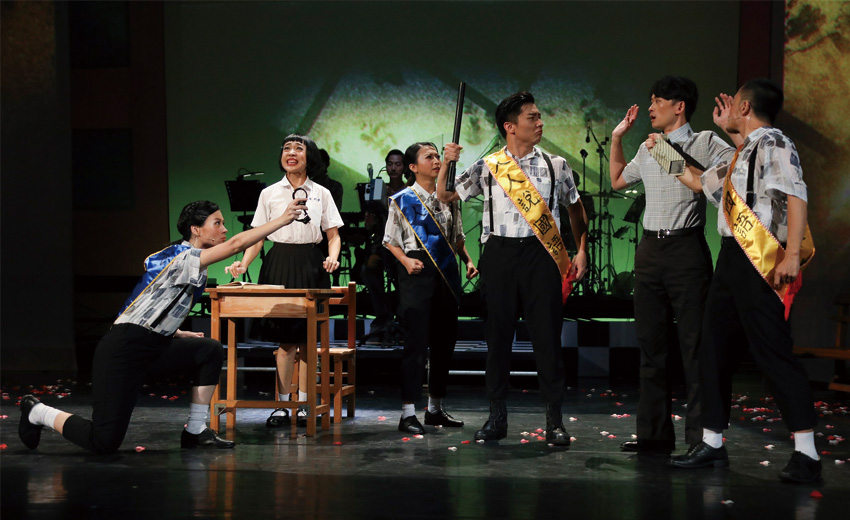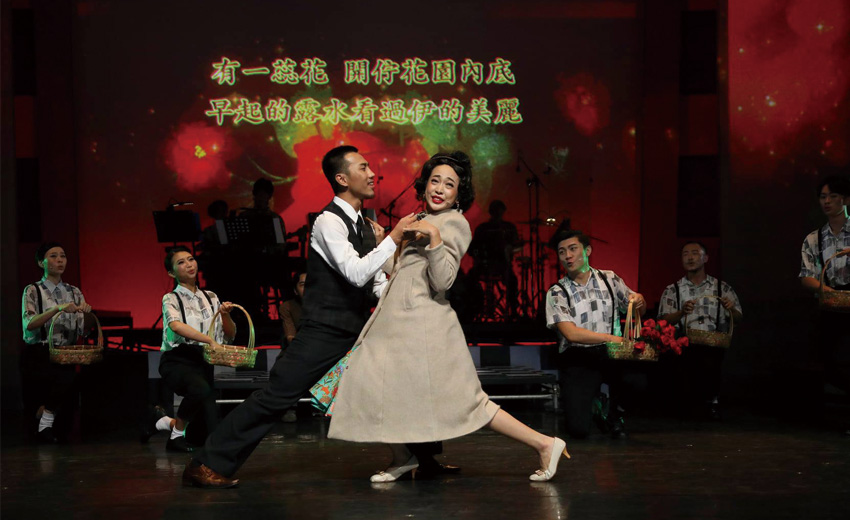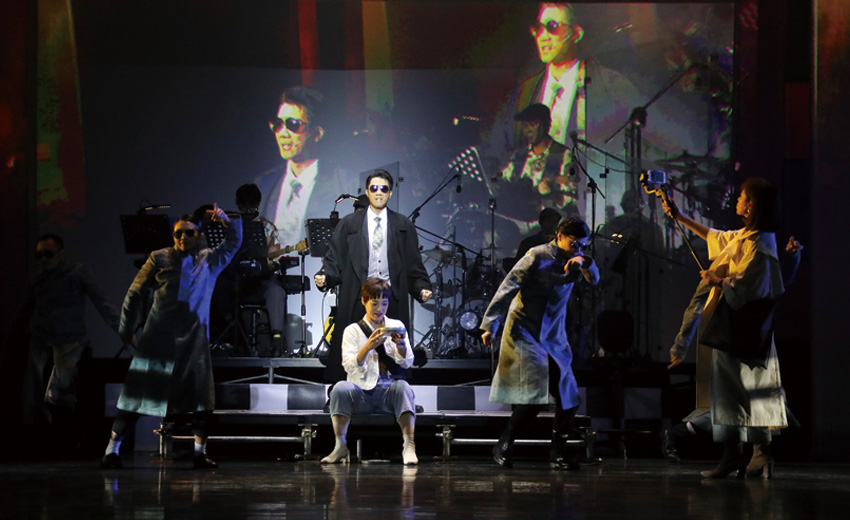本作為雲嘉嘉營四個場館首度整合連線共製、串連資源,由香港劇場空間和台灣阮劇團共同推出,述說台南麻豆電姬戲院、香港北角皇都戲院裡的故事。藉音樂劇形式,談論兩座島嶼上本土語言/文化的興衰,以台灣1940-50年代/香港未來2030年,透過抒情與黑色幽默、台語那卡西/1990年代粵語電影風格個別詮釋。兩組看似完全不同的作品,如何在同一個舞台上演出,是本次製作上設定的挑戰、也是最大的特色。
The State & Denki is the first co-production that brings together the resources of four separate institutions in Yulin County, Chiayi County, Chiayi City and Tainan’s Xinying District. Co-presented by Hong Kong-based Theatre Space and Taiwan’s Our Theatre, the work tells the stories in the Denki Theatre in Madou, Tainan and the State Theatre in Hong Kong. In the form of a musical, the work discusses the rise and fall of native languages and cultures on the two islands and respectively interprets Taiwan in the 1940s to the 1950s as well as Hong Kong in the year of 2030 through lyrical narratives contrasted with dark humor, Taiwanese Nakasi and Cantonese cinematic styles in the 1990s. Consequently, the greatest challenge and feature in this production has been the staging of two completely different works on one stage at the same time.
阮劇團由一群嘉義子弟於2003年成立,致力發展不同於都會觀點的劇場美學,將在地的民俗文化揉合於現代戲劇中,讓表演藝術更積極地走向民眾與社會,「台語」、「常民」是其創作的最大特色。曾多次入圍台新藝術獎,並曾代表台灣至英國愛丁堡藝穗節、羅馬尼亞錫比烏國際戲劇節等國際藝文節慶演出。創團18年來,已累計演出700餘場,並於2018年成立嘉義第一座小劇場空間-新嘉義座。
劇場空間1998年成立於香港,以高水準的翻譯劇,在有限的劇場空間內,開拓無限的視野;透過戲劇玩味人生,提升劇場與社會的互動關係。曾獲香港表演藝術最大獎「香港舞台劇獎」10個以上獎項、43項以上提名,近年更屢次受邀至台南藝術節演出,創下口碑以及票房紀錄。
Our Theatre was founded by a group of local students in Chiayi in 2003. Dedicated to developing theatrical aesthetics different from the perspectives of metropolitan theatres, the theatre company incorporates local folk culture into contemporary theatre, which helps promote performing arts to the general public and the society at large. “Taiwanese language” and “folk elements” form the most prominent features of Our Theatre’s creative work. A frequent nominee of the Taishin Arts Awards, Our Theatre has represented Taiwan to perform at the Edinburgh Festival Fringe in the UK, the Sibiu International Theatre Festival in Romania, and other international culture and arts festivals. Over the 18 years of its establishment, they have performed more than 700 shows. In 2018, Our Theatre founded Chiayi’s very first small-scaled theatre space—Sinkagitso.
Theatre Space was founded in Hong Kong in 1998. The theatre company has created high-quality translated plays and has broadened audiences’ horizons within the limited theatre space. The theatre company ruminates over real life through theatrical performances and fosters a close interaction between theatre and society. Theatre Space is the recipient of more than 10 awards from Hong Kong’s benchmark performing arts award, the Hong Kong Drama Awards, and has been honored with over 43 nominations. In recent years, they have been regularly invited to the Tainan Arts Festival and have created box office records with their well-received performances.
汪兆謙
許正平、郭永康
余振球、汪兆謙
柯鈞元
張飛帆、許正平
余品潔、黃品文
張雅涵、張得恩
張雅媛
余振球
李婕綺
尹信雄
羅士翔、司徒偉健
林玉媛
方玠瑜
李芷柔
林瑞崐
Dub Lau
廖卓良
莊雅雯
許惠淋
羅令珆
陳妤蓁
李冠億、吳盈萱、周家寬、周浚鵬、許照慈、張雅筑、陳守玉、葉興華、劉亭君、謝孟庭、戴旻學(依照姓氏筆畫排列)
新營文化中心演藝廳
關鍵字
藝術家談作品
本劇以兩座象徵著過去臺、港在地民眾文化生活的重要記憶場景,而今卻面臨拆除命運的香港皇都戲院/臺灣臺南麻豆電姬館為背景,在不同語言與故事的組合裡,傳達兩座島嶼對於本土語言/文化興衰的議題思考。
採訪及文字整理|林怡秀
2016年,阮劇團開始與日本流山兒祥導演合作,2018年共創臺語劇場《嫁妝一牛車》,首度入圍臺新藝術獎,此合作除了深化演員肢體、歌唱與舞蹈的訓練,也進一步啟動劇團對於跨國創作及亞洲連線的想法。繼2017年的臺語歌舞劇《城市戀歌進行曲》後,2020年的《皇都電姬》與香港劇場空間合作挑戰音樂劇的共創演出,再次延續對音樂、舞蹈的嘗試。本劇以兩座象徵著過去臺、港在地民眾文化生活的重要記憶場景,而今卻面臨拆除命運的香港皇都戲院/臺灣臺南麻豆電姬館為背景,在不同語言與故事的組合裡,傳達兩座島嶼對於本土語言/文化興衰的議題思考。
所有的創作都是時代的投射
一直以來,阮劇場的創作主張就是推廣自己的母語,團長汪兆謙提到:「我們的策略就是『越在地越國際』,五年前我們開始和東京流山兒★事務所合作,第二個連結出去的城市就是香港的劇場空間。」《皇都電姬》的創作靈感,來自2018年汪兆謙與劇場空間余振球導演偶然聊到臺港兩地在歷史變遷中面臨的文化處境,「其實臺港很多事情都很有關聯,大家都對『母語』這件事很有感,臺語過去被對待的方式就是香港粵語的現在式,兩邊像是鏡子一樣互相對映。所以我們很快就有一個背景的聚焦點就是電影院,用電影院來談關於語言的故事是很適合的,臺港對彼此的電影也很熟悉,電姬館是麻豆很有名的老戲院,皇都對香港人來說也是很代表性的電影院,所以我們劇名也就這樣決定。」背景設定達到共識後,他們進一步設定臺灣導演搭配香港編劇與演員、香港導演與臺灣編劇及演員合作的音樂劇形式,以「語言的消失、文化的消失、身份的消失」為創作主軸。
這件在「雲嘉嘉營劇場連線」支持下的兩年期程委託製作,自2018年開始發想、2019年進入劇本編寫與讀劇階段,於2020年九月首演。但這兩年間,除了香港當地情勢的每日變化,2020年初全球又面臨新冠肺炎的襲擊。談起2018年開始的變動,汪兆謙表示:「2018年臺灣跟香港分別經歷太陽花、雨傘運動,但完全想不到有接下來的反送中,這些對創作者來說一定會有影響,我覺得在無形中也有點讓這件作品在2020年演出的時空下產生某種意義。2020年的疫情隔離,讓演員在演出前仍在等待簽證與隔離,最後兩週才能加入排練,香港的夥伴最後是靠著精神與意志力去完成演出,是想要把這句話講出去的決心讓這個作品有辦法完成。」
舞台上的複音多調
延續阮劇團過去臺語劇的脈絡,《皇都電姬》透過兩個電影院、兩個不同時空的故事與兩組主角,在舞台上組織成一齣非典型的音樂劇。汪兆謙說:「因為我們本來就不是西方音樂劇的系統,演出概念也跟西方不同,某種程度上,我們要做的是『以音樂扮演重要角色』的戲劇作品。」為了讓兩組不同的故事在臺上得以被區分、但又可以帶出相同的感受,無論是故事時間線的對應(過去的臺灣與未來的香港),或工作方法的選擇,兩位導演的共識是「技法越不同越好」,汪兆謙分享:「余導使用比較多隊形編排、寫實的處理,我則是用比較科技性的即時投影、手機live播出。我們在對位上採用很不同的方式,因為這樣的差異在舞台上交集時落差會變大,但這種落差會創造出一種奇特的感受。」
另一方面,《皇都電姬》因為其背景設定,「影像」的狀態也成為回應整部作品議題的想像性角色,「電影本來就是一種探討虛實的表現手法,所以我們很早就各自決定兩邊的女主角都是比較紀錄性質的影像工作者,臺灣這邊的陳敏慧透過拍攝紀錄片的方式尋找自己家族的軌跡;香港這邊的小柔則是透過自己的社群媒體上傳社會運動、抗爭的影像,這兩個女主角既是臺灣也是香港的縮影。劇中的『影像』對我來說則像是第三個角色,因為到最後這個主角消失了,它只能用一種虛的方式存在,它只能用聲音或影像留在我們的回憶裡。」
「語言是我們文化的子彈,創作是我們最後的武器。」這個多次現身於阮劇團各項討論,甚至在劇團自製Podcast節目中與聽眾分享的句子,也隱隱回應著《皇都電姬》編劇許正平曾說的:「所有的創作都是時代的一種投射,透過角色,各自在生命裡遇到的傷害、不能完成的願望、終究會消失的遺憾,可以透過創作的方式去呈現,雖然只有一個晚上,但是卻可以給在現世中苦難的人一點安慰、一點傷痕修復的功能。」
評審談作品
舞台上交錯的臺港兩地時空插敘,敏銳地呈現本土語言是高壓政權迫不及待要伸手廓清的首要場域,臺灣語言受壓迫的過去類比香港的現在,而香港失語的現在更是對臺灣未來的警示,劇中史實與虛構文本的穿插借喻,讓人不禁凜然於歷史殘酷的必然性。
入圍理由
阮劇團一向以本土語言做為創作的深度關照議題,本作以臺港兩地先後在面對政治惡靈的時代激盪中,公民個體失序以及小我命運的卑微出路,同時也讓兩地母語的舞台表現成為劇作中稱職的共鳴雙聲基調。舞台上交錯的臺港兩地時空插敘,敏銳地呈現本土語言是高壓政權迫不及待要伸手廓清的首要場域,臺灣語言受壓迫的過去類比香港的現在,而香港失語的現在更是對臺灣未來的警示,劇中史實與虛構文本的穿插借喻,讓人不禁凜然於歷史殘酷的必然性。(主筆/林育世)
Comment on the Finalist
Our Theatre’s practice has always concentrated on vernacular language as a creative topic. This work revolves around Taiwanese and Hong Kong citizens’ personal turmoil and the meager prospects of individual fate when both places have successively faced the tumultuous times inflicted with political evils. At the same time, the work also transforms the vernacular languages of both places into a suitable foundation of two resonating tones. The interspersed and alternating narratives of Taiwan’s and Hong Kong’s past and present on the stage become a keen portrayal of how native languages are the foremost site to be intervened and interrupted by oppressive political regimes. While the suppression of the Taiwanese language in the past is juxtaposed and compared to Hong Kong’s present time, the latter’s loss of voice becomes a warning for the former’s future as well. By metonymically braiding historical facts and fictional texts, the work makes the audience in awe of the history’s cruel inevitability. (Commentator / LIN Yu-Shih)






